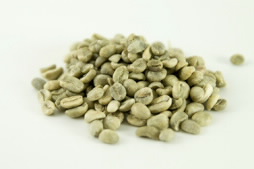EMBARGOED FOR RELEASE | March 27, 2012
New evidence on effects of green coffee beans in weight loss
Note to journalists: Please report that this research was presented at a meeting of the American Chemical Society
A press conference on this topic will be held at 2:30 p.m. Eastern Time, March 27, 2012, in the ACS Press Center, Room 15A, in the San Diego Convention Center. Reporters can attend in person or access live audio and video of the event and ask questions at www.ustream.tv/channel/acslive.
***The paper related to this work was retracted in 2014. The paper is: Vinson JA, Burnham BR, Nagendran MV. Diabetes, Metabolic Syndrome and Obesity: Targets and Therapy. 2012;5:21–27. The retraction notice is available here.***
SAN DIEGO, March 27, 2012 — Scientists today reported striking new evidence that green, or unroasted, coffee beans can produce a substantial decrease in body weight in a relatively short period of time.
In a study presented at the 243rd National Meeting & Exposition of the American Chemical Society (ACS), the world’s largest scientific society, Joe Vinson, Ph.D., and colleagues described how a group of overweight or obese people who consumed a fraction of an ounce of ground green coffee beans each day lost about 10 percent of their body weight.
Media Contact
During the meeting, March 23-28, the contacts can be reached at 619-525-6268.
Michael Bernstein
202-872-6042
m_bernstein@acs.org
Michael Woods
202-872-6293
m_woods@acs.org
“Based on our results, taking multiple capsules of green coffee extract a day — while eating a low-fat, healthful diet and exercising regularly — appears to be a safe, effective, inexpensive way to lose weight,” Vinson said at the ACS meeting, being held here this week. He is with the University of Scranton in Pennsylvania.
The study involved 16 overweight or obese people aged 22-26 years who took capsules of the extract or capsules containing a placebo, an inactive powder, for a total of 22 weeks. The subjects alternated between a low dose and a higher dose of the extract. The low dose consisted of 700 mg of the coffee extract, and the high dose was 1,050 mg. It was a so-called “cross-over” study in which people cycled through the two doses and the placebo, each for six weeks. Such studies have advantages because each person serves as his or her own “control,” improving the chances of getting an accurate result.
All of the participants were monitored for their overall diet (calories, food eaten, etc.) and exercise over the study period. “Their calories, carbohydrates, fats and protein intake did not change during the study, nor did their exercise regimen change,” Vinson said.
Participants lost an average of 17 pounds during the 22 weeks of the study. It included an average of a 10.5 percent decrease in overall body weight and a 16 percent decrease in body fat. Vinson noted that weight loss might have been significantly faster, except that participants received the placebo and the lower dose of green coffee extract for part of the study period.
Vinson pointed out that previous studies have shown weight loss with green coffee. But this was the first to use higher amounts of the coffee extract and the first to measure the response to various doses. Based on those studies, Vinson believes that green coffee beans’ effects likely are due to a substance called chlorogenic acid that is present in unroasted coffee beans. Chlorogenic acid breaks down when coffee beans are roasted (usually at a temperature of 464-482 degrees Fahrenheit). Roasting gives coffee beans their distinctive color, aroma and flavor. Green coffee beans, in contrast, have little aroma and a slightly bitter taste.
To automatically receive news releases from the American Chemical Society contact newsroom@acs.org.
###

capsules can be an effective tool for losing
weight.

